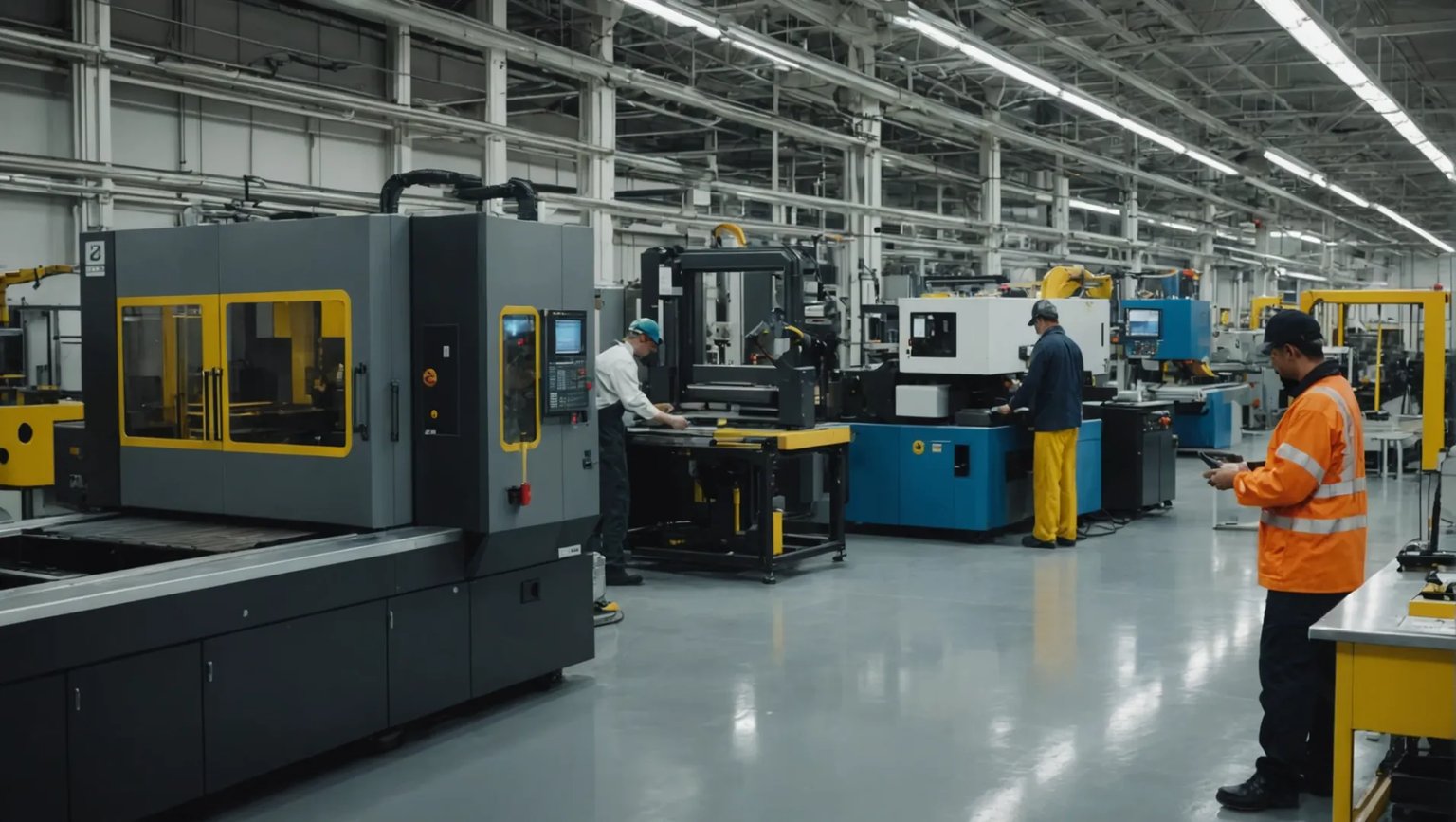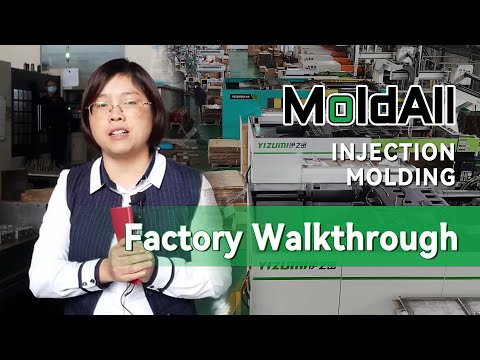
In today’s fast-paced manufacturing world, plastic molding services stand as a cornerstone for producing diverse plastic components efficiently.
Plastic molding services involve the professional processing of raw plastic into customized products through various molding techniques. These services are pivotal in manufacturing sectors due to their ability to produce high-quality, precise components cost-effectively.
While the concept of plastic molding might sound straightforward, understanding the specifics of these services reveals their true value. Delve into the different methods and benefits of plastic molding services to see how they cater to specific industrial needs and enhance production efficiency.
Injection molding is ideal for continuous profiles.False
Extrusion molding, not injection molding, is best for continuous profiles.
How Do Different Plastic Molding Techniques Compare?
Understanding different plastic molding techniques can revolutionize how industries approach production challenges.
Plastic molding techniques vary primarily in their applications, precision, and efficiency. Injection molding excels in producing complex shapes with high accuracy, while extrusion is ideal for continuous profiles. Blow molding creates hollow products, and thermoforming suits shallow designs. Each technique serves distinct industrial needs and specifications.

Injection Molding vs. Extrusion Molding
Injection molding is a cornerstone in the manufacturing of complex, intricate parts with high precision. It involves injecting molten plastic into a mold cavity, where it cools and solidifies. This method is ideal for products requiring tight tolerances, such as automotive parts and electronics housings. One of the main advantages of injection molding is its ability to produce parts with varied geometry efficiently.
In contrast, extrusion molding1 is best suited for creating continuous profiles like pipes and sheets. During extrusion, melted plastic is forced through a die to shape it before cooling. This process is efficient for producing large quantities of simpler products but lacks the ability to handle the intricate detail possible with injection molding.
Blow Molding vs. Thermoforming
Blow molding is another popular technique primarily used for making hollow plastic products like bottles and containers. The process involves extruding a tube of molten plastic, which is then inflated to form the shape of the mold cavity. Blow molding excels in producing lightweight, hollow parts with uniform wall thickness.
On the other hand, thermoforming2 involves heating a plastic sheet until pliable and then forming it over a mold to achieve the desired shape. It’s particularly suitable for large parts with shallow depth, such as packaging trays and panels. Thermoforming is generally less expensive than other methods but may not offer the same level of precision.
Comparison Table of Techniques
| Technique | Ideal Products | Advantages | Limitations |
|---|---|---|---|
| Injection Molding | Complex, precise parts | High accuracy, variety in shapes | Higher setup costs |
| Extrusion Molding | Continuous profiles | Efficient for large quantities | Limited to simpler designs |
| Blow Molding | Hollow items | Lightweight, uniform thickness | Not suitable for complex shapes |
| Thermoforming | Shallow items | Cost-effective for large parts | Less precision |
Each of these techniques brings unique strengths to the table, allowing manufacturers to choose based on specific product needs and production scales. Understanding these differences can guide industries in selecting the most cost-effective and efficient method for their production requirements.
Injection molding produces complex shapes with high accuracy.True
Injection molding is known for its precision in creating intricate parts.
Thermoforming is ideal for creating hollow plastic products.False
Blow molding, not thermoforming, is used for hollow products like bottles.
What Are the Key Benefits of Using Plastic Molding Services?
Plastic molding services transform raw materials into versatile products, offering numerous benefits across industries.
Plastic molding services provide cost-effective production, customization, high precision, and improved product quality, making them invaluable in manufacturing.

Cost-Effectiveness
One of the primary advantages of plastic molding services3 is their cost-effectiveness. For businesses, avoiding upfront investments in expensive machinery and molds is a significant benefit. Instead of purchasing costly equipment for plastic processing, companies can leverage the existing infrastructure of service providers. Additionally, service providers often achieve economies of scale through large-scale production and optimized processes, reducing per-unit costs and offering competitive pricing to customers.
Customization and Flexibility
Plastic molding services offer an impressive degree of customization. Businesses can present their design drawings or product samples, and service providers will tailor their approach to meet specific requirements. This customization is not only about altering shapes or sizes but also involves selecting suitable materials and production methods tailored to the product’s intended use. For instance, micro-injection molding4 is used for producing tiny components with extreme precision, a necessity in the electronics industry.
High Precision and Quality Assurance
Precision in manufacturing is crucial, especially in industries where even minute discrepancies can lead to product failure. Plastic molding techniques like injection molding are known for producing components with high dimensional accuracy. The use of advanced technologies like CNC machining ensures molds are crafted with precision, directly affecting the quality of the final product. Further, comprehensive quality control measures, including raw material testing and performance testing during production, guarantee the consistency and reliability of each batch produced.
Advanced Technology and Expertise
Service providers are equipped with state-of-the-art technology and staffed by a team of skilled experts, including mold designers and process engineers. By constantly adopting advanced techniques such as gas-assisted injection molding or two-color injection molding, they enhance product performance and functionality. This expertise translates into superior products that meet stringent industrial standards and customer expectations.
A Quick Comparison: Benefits at a Glance
| Benefit | Description |
|---|---|
| Cost-Effectiveness | Reduced initial investment and competitive pricing through optimized processes. |
| Customization | Tailored designs to meet specific industrial needs. |
| High Precision | Advanced technology ensures dimensional accuracy and consistent quality. |
| Technological Expertise | Access to cutting-edge molding techniques and professional teams. |
These factors collectively illustrate why plastic molding services are integral to modern manufacturing, providing solutions that are both economically viable and adaptable to diverse industrial demands.
Plastic molding services reduce initial investment costs.True
They eliminate the need for businesses to buy expensive machinery.
Plastic molding services lack customization options.False
They offer high customization, tailoring designs to specific needs.
How Do Plastic Molding Services Ensure Quality Control?
Ensuring quality control in plastic molding is vital for delivering consistent, reliable products across industries.
Plastic molding services ensure quality control through meticulous mold design, rigorous material testing, and comprehensive inspection protocols during production. These processes guarantee product consistency, meet industry standards, and fulfill customer specifications.

The Role of Mold Design and Manufacturing
Mold design is the foundation of quality in plastic molding services. A well-designed mold not only dictates the shape and size of the final product but also influences its precision and consistency. Service providers employ advanced technologies like CNC machining and EDM to create molds that meet exact specifications.
- Material Selection: Choosing the right materials for the mold, such as steel or aluminum alloy, is crucial. These materials must withstand the pressures and temperatures involved in molding processes without deforming, ensuring durability and precision in every batch.
- Precision Engineering: Advanced tools and techniques are used to manufacture molds with high accuracy, minimizing defects and ensuring each product is identical to the prototype.
Quality Control Measures in Molding Processes
Once the mold is ready, various molding techniques like injection, extrusion, blow, and thermoforming are employed. Each technique requires specific quality control measures to maintain standards:
- Injection Molding: This process demands precise temperature and pressure controls to produce parts with complex shapes and high dimensional accuracy. Regular calibration of machines ensures consistent production quality.
- Extrusion Molding: Continuous monitoring of the extruder ensures consistent output in terms of profile dimensions and surface finish. Regular equipment maintenance prevents deviations.
Post-Processing Quality Checks
After molding, additional steps are taken to refine and enhance the product:
- Trimming and Polishing: These processes remove burrs and improve surface finish, enhancing both aesthetics and functionality. Ensuring that these steps are meticulously carried out is crucial for overall quality.
- Surface Treatments: Techniques like printing, spraying, or electroplating add value to products by improving durability or aesthetics. These are tested for adhesion and performance under various conditions.
Rigorous Inspection Protocols
Quality inspection is a multi-step process involving:
- Raw Material Testing: Before production begins, raw materials are tested against relevant standards to ensure they meet necessary specifications for safety and performance.
- In-Process Inspection: During manufacturing, dimensions, appearance, and performance are regularly checked to ensure products conform to customer requirements.
- Final Product Testing: Finished products undergo sampling and testing before being shipped. Quality inspection reports are generated to provide transparency and assurance to customers.
Leveraging Advanced Technology for Enhanced Quality Control
Service providers constantly adopt advanced technologies like micro-injection molding or gas-assisted injection molding. These innovations not only improve efficiency but also enhance quality by reducing defects and enabling more complex designs.
For instance, micro-injection molding5 allows for the production of extremely small components with high precision, critical in industries like electronics and medical devices.
By ensuring stringent quality control across all these stages, plastic molding services provide reliable products that meet industry standards and exceed customer expectations.
Mold design impacts product consistency.True
A well-designed mold ensures precision and uniformity in plastic products.
Micro-injection molding is used for large components.False
Micro-injection molding is specifically for small, precise components.
Which Industries Benefit the Most from Plastic Molding Services?
Plastic molding services are indispensable in various industries, revolutionizing production and product design.
Industries such as automotive, electronics, home appliances, medical, and packaging benefit immensely from plastic molding services. These services enable efficient mass production of intricate parts and components, enhancing both quality and cost-effectiveness.

Automotive Industry
The automotive sector heavily relies on plastic molding for manufacturing a multitude of components like bumpers, dashboards, and interior trims. The mold design6 is critical as it ensures parts meet precision and durability standards. This reliance on plastic molding reduces weight and cost while enhancing fuel efficiency and design flexibility.
Electronics Industry
In electronics, plastic molding facilitates the creation of durable and lightweight housings for devices such as smartphones, computers, and televisions. The ability to produce these with high dimensional accuracy is paramount, given the increasing demand for smaller, more compact electronics.
Home Appliances
Plastic molding services are pivotal in producing parts like refrigerator housings and washing machine components. The capability to customize designs7 to fit specific appliance models allows manufacturers to innovate while maintaining cost-effectiveness.
Medical Sector
Medical devices demand high precision and sterility, making plastic molding indispensable for items like syringes and catheters. The industry benefits from advanced techniques that allow for intricate designs required in modern medical equipment.
Packaging Industry
Plastic molding is also transformative in the packaging industry. It enables the production of a vast array of containers like bottles and boxes. The efficiency of processes such as blow molding8 ensures that these items are produced quickly and at scale.
| Industry | Key Components Produced | Advantages |
|---|---|---|
| Automotive | Bumpers, dashboards, interior trims | Cost reduction, weight saving |
| Electronics | Device housings, connectors | High precision, lightweight |
| Home Appliances | Housings, internal components | Design customization, durability |
| Medical | Device housings, syringes, catheters | Precision, sterility |
| Packaging | Bottles, boxes | Fast production, scalability |
Each industry harnesses these services for tailored solutions that meet unique market demands.
Automotive industry relies on plastic molding for dashboards.True
Plastic molding is used to produce automotive components like dashboards.
Plastic molding is rarely used in the medical sector.False
Plastic molding is crucial for producing precise, sterile medical devices.
Conclusion
Plastic molding services are integral to modern manufacturing, offering tailored solutions that enhance product quality and reduce costs. Embrace these services to stay competitive and innovative in diverse markets.
-
Explore detailed distinctions between these two popular molding methods.: Unlike plastic extrusion, injection molding can be used to form three-dimensional shapes. With this method, manufacturers inject plastic resin … ↩
-
Learn about the thermoforming process and its applications.: Thermoforming technology involves obtaining a desired shape by heating and forming a … ↩
-
Explore detailed advantages for cost-effective production benefits.: Injection molding has a number of advantages. It minimises molding costs and is a highly repeatable way of producing plastic or elastomeric parts with high … ↩
-
Learn how micro-injection molding enhances precision for tiny components.: Micro injection molding offers significant advantages in the manufacturing of various electronic components. One example is micro-optics which … ↩
-
Explore how micro-injection molding enhances precision in small component production.: Micro molding is a highly specialized manufacturing process that produces extremely small, high-precision thermoplastic components with micron tolerances. ↩
-
Learn how precise mold design influences automotive component quality.: Automotive manufacturing has become more manageable with short lead time and highly profitable due to plastic injection molding technology. ↩
-
Discover how customization enhances appliance functionality and appeal.: FOW Mold is experienced in the design and manufacturing of home appliances and home appliance molds. Contact an expert to support your project. ↩
-
Explore how blow molding optimizes packaging production efficiency.: Rotational molding offers advantages such as design freedom, cost-effective tooling, and enhanced durability. ↩






